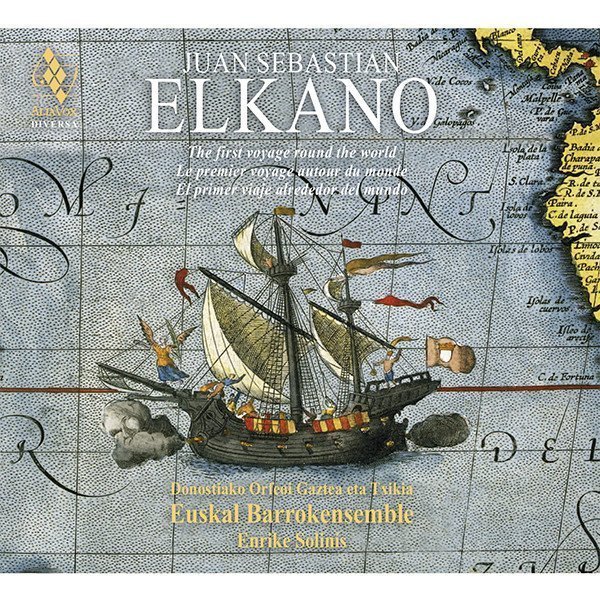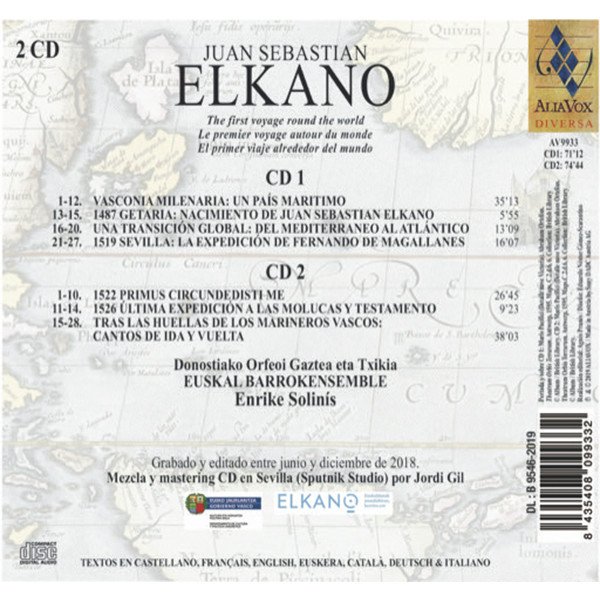JUAN SEBASTIAN ELKANO
The first voyage round the world
32,99€
For those of us who are lucky enough to have been able to travel in space and time with Jordi Savall as members of his ensembles and to learn from each of his projects, launching a new programme with the figure of the outstanding Basque navigator Juan Sebastián Elcano to guide us on a musical journey through his world and his times is a congenial task. The premise is clear and the principle is a simple one: music is the quintessential universal language, which has united remote peoples through the ages, as it still does today. The same man who, 500 years ago, took part in an expedition commanded by Ferdinand Magellan to find the Spice Islands for the Crown of Castile, and who despite having established a landmark in universal history by circumnavigating the Earth, is nowadays unknown in much of the world, and yet provides us with a perspective on the past which enhances our enjoyment and understanding of the present.
Re-discovering Elcano
For those of us who are lucky enough to have been able to travel in space and time with Jordi Savall as members of his ensembles and to learn from each of his projects, launching a new programme with the figure of the outstanding Basque navigator Juan Sebastián Elcano to guide us on a musical journey through his world and his times is a congenial task. The premise is clear and the principle is a simple one: music is the quintessential universal language, which has united remote peoples through the ages, as it still does today. The same man who, 500 years ago, took part in an expedition commanded by Ferdinand Magellan to find the Spice Islands for the Crown of Castile, and who despite having established a landmark in universal history by circumnavigating the Earth, is nowadays unknown in much of the world, and yet provides us with a perspective on the past which enhances our enjoyment and understanding of the present.
The Basque maritime culture to which Elcano was heir has brought us into contact with other peoples since time immemorial, and it has also acquainted us with their songs, dances and music. It is difficult to track down the influences in the north of the Iberian Peninsula of the Hellenic peoples from the East, the Celts and the Vikings from northern Europe, but we share instruments, allegories and musical forms with all those peoples with whom we have had dealings thanks to the sea. Like many other peoples, we Basques have been pagans, Jews, Muslims, Christians… and all these religions have made their mark, shaping us into what we are today. Because of the Basque Country’s location as the real gateway from Al-Andalus to Europe and vice versa, as well as being a stage on the Pilgrim’s Way of St. James, it was a magnet for diverse cultures and a meeting-point for different worlds. Tudela, for example, was the birthplace and centre for outstanding Muslim and Jewish writers, as well as a major trading and shipbuilding city during the 12th-15th centuries, when the River Ebro was navigable as far as the sea. For all these reasons, it is important to study and observe these cultures and their traditions today and to recognize how much we are reflected in them, to communicate directly with them and to enjoy the whole process.
+ information in the CD booklet
MIREN ZEBERIO and ENRIKE SOLINÍS
Tolosa, December 2018
Translated by Jacqueline Minett








Share